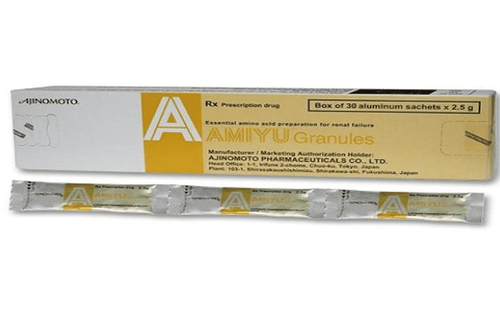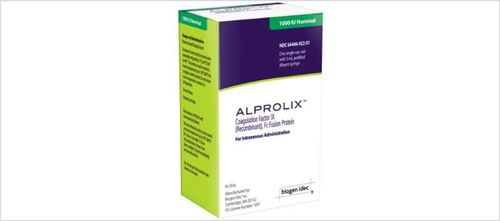This is an automatically translated article.
Amiparen is a drug belonging to the group of gastrointestinal drugs. The drug comes in the form of a solution for intravenous infusion and should only be used by healthcare professionals. So what disease does Amiparen treat?
1. What is Amiparen?
Amiparen is a drug often used to supplement amino acids in cases of patients with reduced plasma protein, malnutrition, before and after surgery.
Amiparen is prepared as a solution for intravenous infusion. The drug is packaged in two forms: 200ml bottles and 500ml bottles.
2. Dosage and instructions for using Amiparen
Amiparen is an infusion that should be administered by medical personnel. The drug is administered intravenously into the patient's body.
Dosage of Amiparen when infused through the central venous system:
Usual dose for adults: Infuse from 800 - 1600ml Amiparen - 5 solution in a day. Patients need to provide information about their age, weight and symptoms so that the doctor can prescribe the right dose of medicine. Dosage of Amiparen when infusion through the peripheral intravenous system:
Normally for adults: use from 400 - 800ml Amiparen - 5 for each infusion. During infusion, the infusion rate should be adjusted to deliver approximately 10 g of amino acids over 60 minutes to achieve optimal amino acid utilization. For children, the elderly and critically ill patients, it is necessary to change the infusion rate to a slower one to ensure safety. Amiparen dosage also varies depending on the age, clinical symptoms and weight of the patient. To increase the effect of amino acids, Amiparen should be used in combination with a carbohydrate solution. The above dosage is for reference only. Patients should be examined by a doctor or medical professional to be adjusted to the dose appropriate to the condition and the progress of the disease.
Amiparen is given to the patient by medical staff, so it is rare to forget a dose.
In case of overdose of Amiparen, it is necessary to immediately contact the treating doctor for timely, safe and effective treatment.
Some notes when using Amiparen for patients include:
It is necessary to conduct appropriate sterilization and preventive measures to reduce the risk of cross-infection due to infusion. When administering Amiparen to a patient in a cold environment, the drug solution should be warmed to a temperature approximately similar to that of the human body. Before opening the plastic bag, it is necessary to check the color of the color indicator. Never use the solution bottle when the color indicator tablet has turned blue or purple. The vial is for single use only. In the event that it is not used up, discard the excess solution. Absolutely do not use fluid bottles with leaks, cloudy or discolored. Expired bottles are no longer in use. Monitor and reduce infusion rate in elderly patients.
3. What side effects may be encountered when taking Amiparen?
Uncommon side effects:
Digestive effects: Patients may have nausea or vomiting. Cardiovascular effects: The drug causes chest pain or palpitations. Effects on the liver: Increases liver enzymes, increases total bilirubin. Effects on the kidneys: the drug increases blood urea nitrogen. Rare side effects:
The drug causes hypersensitivity reactions such as skin rash. In the case of infusion of large amounts of Amiparen or infusion at a rapid rate, acidosis may occur in the patient. Some other undesirable effects may be encountered such as chills, headache, pulse pain very rarely. In case the patient shows the above signs or has any other unusual symptoms, it is necessary to immediately notify the doctor for appropriate treatment.
4. The subjects need to be careful when taking Amiparen
Amiparen is contraindicated in the following cases:
Patients with hepatic coma or at risk of hepatic coma. Patients with severe renal failure or hypernitremia. Patients with abnormal amino acid metabolism. The subjects that need to be cautious when taking Amiparen include:
Patients with severe acidosis. The patient has congestive heart failure. People with hyponatremia. The patient is debilitated and severely dehydrated.
5. What should be noted when using Amiparen?
Before taking Amiparen, patients need to inform their doctor about their own problems such as:
If you are pregnant or breastfeeding, you need to weigh the benefits and risks when using the drug. The patient is allergic to any of the ingredients in Amiparen. The patient is allergic to food, chemicals, dyes or any animal. Inform your doctor about your health status, weight, and physical condition so that the doctor can adjust the appropriate dose. Amiparen may interact with certain other medications you are taking. Thereby affecting health as well as the effectiveness of treatment. Therefore, patients need to inform the doctor about the medicines they are taking so that the doctor can prescribe the right medicine.
Food, alcohol and tobacco can interact with certain drugs. Ideally, the patient should not take them while using the drug. Patients should be careful when taking Amiparen with food.
Amiparen is a drug given intravenously to provide amino acids in the case of hypoproteinemia, malnutrition, before and after surgery. This is a prescription drug, so patients should not self-medicate. Please inform your doctor about your health condition so that you can prescribe the appropriate dose of medicine, ensure safety and effective treatment.
Follow Vinmec International General Hospital website to get more health, nutrition and beauty information to protect the health of yourself and your loved ones in your family.
Please dial HOTLINE for more information or register for an appointment HERE. Download MyVinmec app to make appointments faster and to manage your bookings easily.













